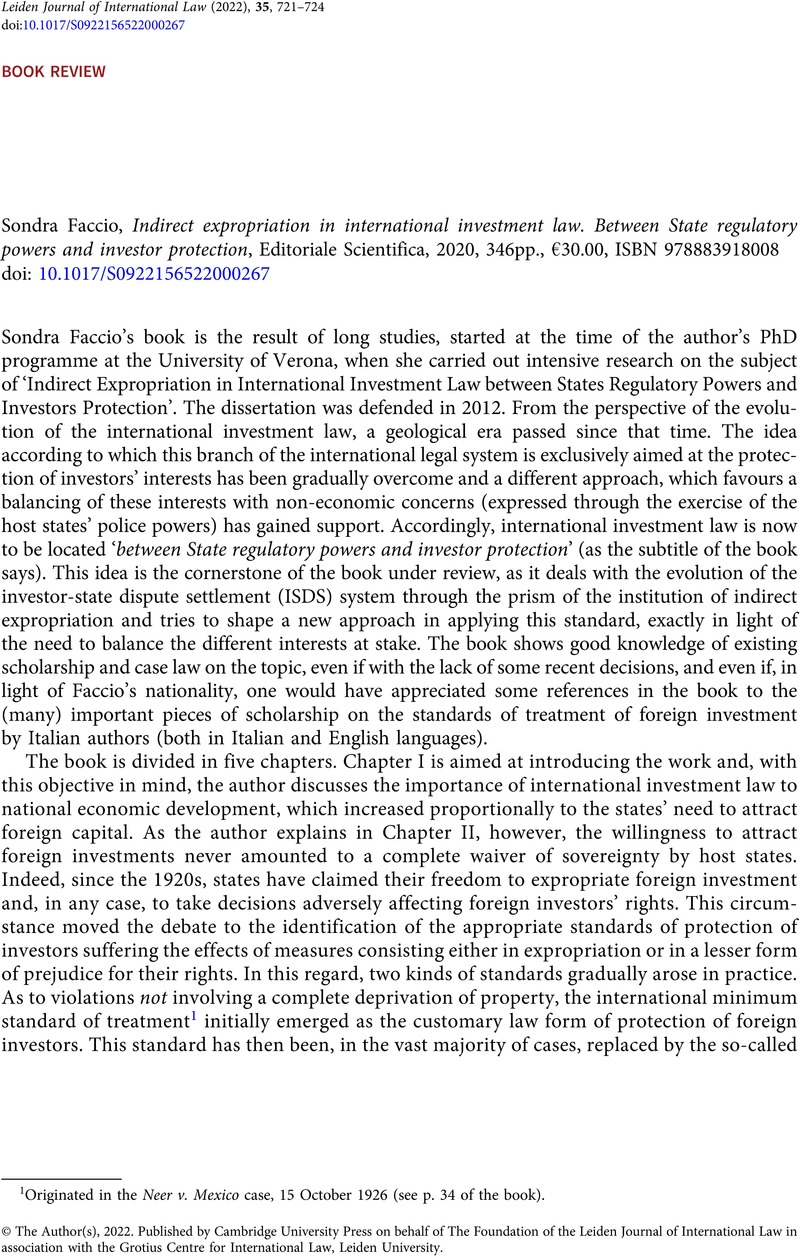No CrossRef data available.
Published online by Cambridge University Press: 01 June 2022

1 Originated in the Neer v. Mexico case, 15 October 1926 (see p. 34 of the book).
2 As well-known, FET involves the compensation of damages to investors in cases where their rights have been violated by states due to an exercise of arbitrariness, consisting in (i) a violation of the investors’ legitimate expectations, (ii) a violation of the due process of law, or (iii) a disproportionate sacrifice of the investors’ position. This tripartite approach to FET is due to F. M. Palombino, Fair and Equitable Treatment and the Fabric of General Principles (2018).
3 The reference applies to those expropriations occurring in a discriminatory manner, without a public purpose, a due process of law, and the payment of compensation.
4 S. Faccio, Indirect expropriation in international investment law. Between state regulatory powers and investor protection (2020), 195.
5 Y. Nouvel, ‘L’indemnisation d’une Expropriation Indirecte’, (2003) 5 International Law – Forum du Droit International, at 198 (the original French text: aujourd’hui, l’indemnisation s’évaue moins selon la licéité de l’expropriation que selon la rentabilité des avoirs expropriés).
6 According to Faccio’s opinion, this is the real difference with violations of the FET standard, involving violations of the investors’ rights which do not amount to a ‘taking’ of the investment.
7 Faccio, supra note 4, at 270.
8 The reference applies to U. Kriebaum, ‘Regulatory Takings: Balancing the Interests of the Investor and the State’, (2007) 8 Journal of World Investment & Trade, at 717, 743.
9 Faccio, supra note 4, at 271.
10 I already expressed these perplexities in G. Zarra, ‘Right to Regulate, Margin of Appreciation and Proportionality: Current Status in Investment Arbitration in Light of Philip Morris v. Uruguay’, (2017) 14 Brazilian Journal of International Law, at 94, 106.
11 Proportionality being strictly anchored to the application of the tripartite test based on suitability, necessity and proportionality stricto sensu. See the detailed analysis made by Palombino, supra note 2, at 124
12 See, in general terms, G. Perlingieri, Profili applicativi della ragionevolezza nel diritto civile (2015); with specific regard to international law see E. Cannizzaro, ‘Ragionevolezza e proporzionalità nel diritto internazionale’, (2002) 7 Ars interpretandi, at 347.
13 On the criticisms to the ISDS system see G. Zarra, ‘The New Investor-State Dispute Settlement Mechanisms Proposed by the EU and the Geneva Centre for International Dispute Settlement. A Step forward or a Hasty Reform?’, (2018) 13 Studi sull’integrazione europea, at 389.
14 M. L. Padelletti, La tutela della proprietà nella Convenzione europea dei diritti dell’uomo (2003), at 800–1.
15 See supra note 6.
16 A partial exception to what is stated in the text is Joseph Charles Lemire v. Ukraine, ICSID Case No. ARB/06/18, Decision on Jurisdiction and Liability of 14 January 2010, paras. 303–306, on which the author correctly spends a lot of words (at 241 and 258).
17 Philip Morris Brands Sàrl, Philip Morris Products SA and Abal Hermanos SA v. Oriental Republic of Uruguay, ICSID Case No. ARB/10/7 of Award, 8 July 2016, para. 287.
18 Marfin Investment Group Holdings S.A., Alexandros Bakatselos and Others v. Republic of Cyprus, ICSID Case No. ARB/13/27, Award of 26 July 2018, para. 826.